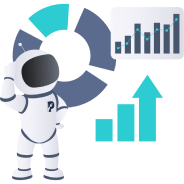

What is the Google Penguin algorithm update
Google Penguin is a set of updates and data refreshes to the Google core algorithm, known as ‘Hummingbird’. Penguin, along with Google Panda, is one of the greatest core updates.
Google Penguin algorithm update was launched in April 2012 and has had seven major updates since. The final one, known as Penguin 4.0, has been released in September 2016. Google Penguin is now an integral part of the Google core algorithm.
The purpose of the Google Penguin update
The primary goal is penalizing spammy websites that were using manipulative techniques to position themselves high in search results. These websites achieved high positions on SERP by violating Google Webmaster Guidelines. The offenders were mostly using black hat SEO techniques, such as creation of thousands of artificial links pointing to the same page. After the Penguin update, their positions in search engine results successfully decreased.
The Penguin update affected approximately 3% of English, German, Chinese and Arabic keyword queries at the time of deployment.
How Penguin initially worked
Early Penguin operated on a periodic basis. It would scan the Internet, determine the spammy websites and penalize them. It would take a while until Penguin would rescan those websites and re-evaluate them. The main flaw with Penguin periodic operation was that websites hit by the algorithm stayed penalized until the next scan. Today, Penguin works in real-time. This means that the spam filter penalizes spammy websites and releases fixed websites momentarily.
The current state of Penguin
Penguin, as of its seventh iteration, has become more precise and discriminating. While in the past Penguin would penalize the entire website, it is now much more precise. According to the official statement from Google:
Penguin is now more granular. Penguin now devalues spam by adjusting ranking based on spam signals, rather than affecting ranking of the whole site. It means it affects finer granularity than sites. It does not mean it only affects pages.
The final version of Penguin is able to isolate specific pages instead of penalizing the entire website. Also, there were examples in the past of Google isolating and demoting a single page on popular websites such as Mozilla and BBC. The rest of the website would not come under penalty.
How to remove Penguin penalties
The best methods to remove a penalty are as follows:
- disavow bad links
- start building high-quality links
The percentage of good links versus bad links is the most important metric Penguin evaluates. Increase the percentage of good links and lower the number of spammy links to restore your website and recover its rankings.
Future Penguin updates
Penguin update is now an integral part of Google algorithm. There will be no more official statements about its updates.











